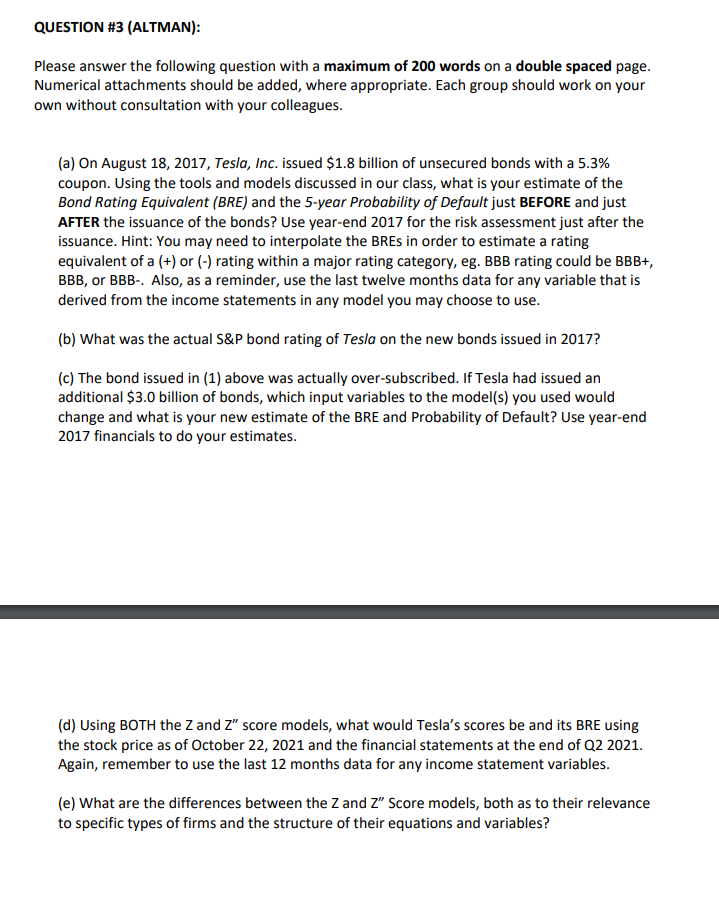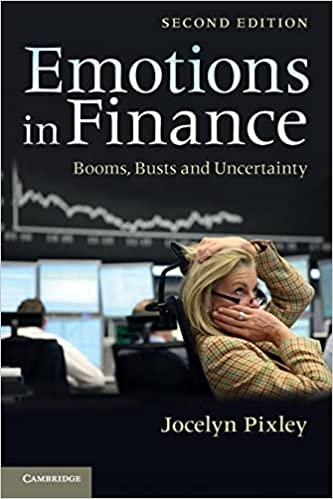
QUESTION #3 (ALTMAN): Please answer the following question with a maximum of 200 words on a double spaced page. Numerical attachments should be added, where appropriate. Each group should work on your own without consultation with your colleagues. (a) On August 18, 2017, Tesla, Inc. issued $1.8 billion of unsecured bonds with a 5.3% coupon. Using the tools and models discussed in our class, what is your estimate of the Bond Rating Equivalent (BRE) and the 5-year Probability of Default just BEFORE and just AFTER the issuance of the bonds? Use year-end 2017 for the risk assessment just after the issuance. Hint: You may need to interpolate the BREs in order to estimate a rating equivalent of a (+) or (-) rating within a major rating category, eg. BBB rating could be BBB+, BBB, or BBB-. Also, as a reminder, use the last twelve months data for any variable that is derived from the income statements in any model you may choose to use. (b) What was the actual S&P bond rating of Tesla on the new bonds issued in 2017? (c) The bond issued in (1) above was actually over-subscribed. If Tesla had issued an additional $3.0 billion of bonds, which input variables to the model(s) you used would change and what is your new estimate of the BRE and Probability of Default? Use year-end 2017 financials to do your estimates. (d) Using BOTH the Z and Z" score models, what would Tesla's scores be and its BRE using the stock price as of October 22, 2021 and the financial statements at the end of Q2 2021. Again, remember to use the last 12 months data for any income statement variables. (e) What are the differences between the Z and Z" Score models, both as to their relevance to specific types of firms and the structure of their equations and variables? QUESTION #3 (ALTMAN): Please answer the following question with a maximum of 200 words on a double spaced page. Numerical attachments should be added, where appropriate. Each group should work on your own without consultation with your colleagues. (a) On August 18, 2017, Tesla, Inc. issued $1.8 billion of unsecured bonds with a 5.3% coupon. Using the tools and models discussed in our class, what is your estimate of the Bond Rating Equivalent (BRE) and the 5-year Probability of Default just BEFORE and just AFTER the issuance of the bonds? Use year-end 2017 for the risk assessment just after the issuance. Hint: You may need to interpolate the BREs in order to estimate a rating equivalent of a (+) or (-) rating within a major rating category, eg. BBB rating could be BBB+, BBB, or BBB-. Also, as a reminder, use the last twelve months data for any variable that is derived from the income statements in any model you may choose to use. (b) What was the actual S&P bond rating of Tesla on the new bonds issued in 2017? (c) The bond issued in (1) above was actually over-subscribed. If Tesla had issued an additional $3.0 billion of bonds, which input variables to the model(s) you used would change and what is your new estimate of the BRE and Probability of Default? Use year-end 2017 financials to do your estimates. (d) Using BOTH the Z and Z" score models, what would Tesla's scores be and its BRE using the stock price as of October 22, 2021 and the financial statements at the end of Q2 2021. Again, remember to use the last 12 months data for any income statement variables. (e) What are the differences between the Z and Z" Score models, both as to their relevance to specific types of firms and the structure of their equations and variables







